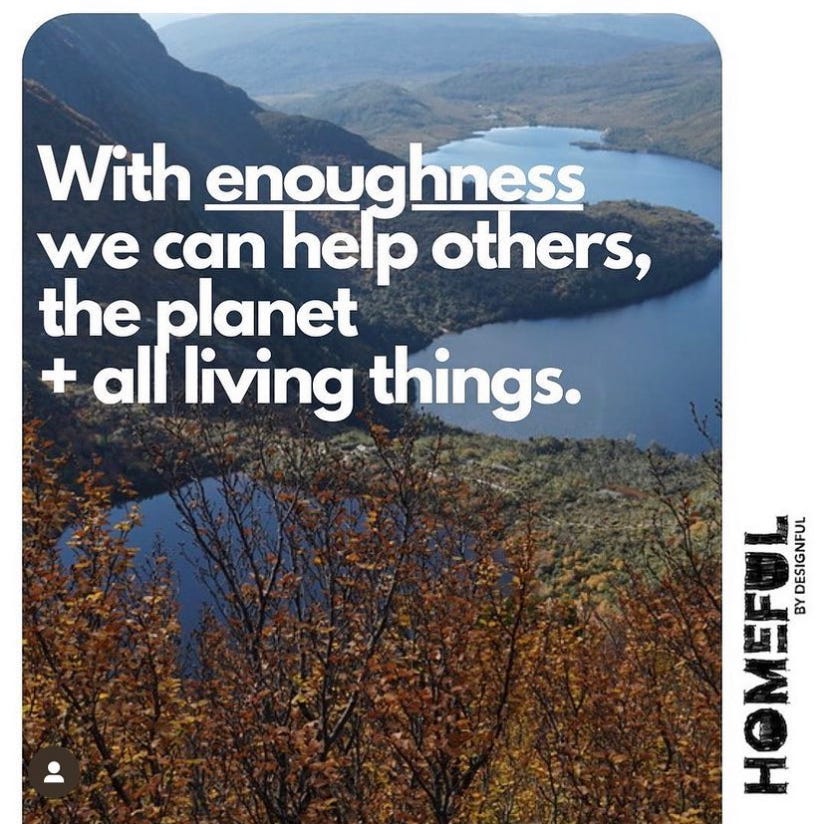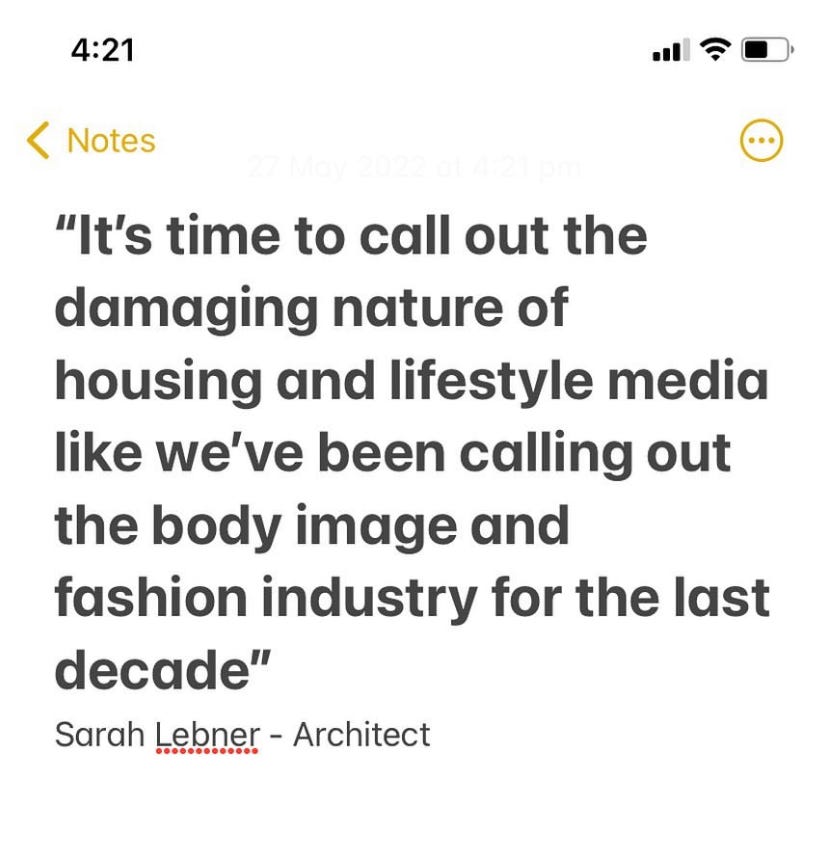Part 3 - Enoughness in the building industry // A movement towards what matters.
This is the last part of my BDAA national festival key note. I hope its planted some seeds and sprouted lots of questions. I look forward to the conversations these questions bring!
If you would like to read part 1 and 2 first you can find them here: Part 1 + Part 2 .
What is enough when considering our homes?
How can we help our clients consider what's enough for them so they can live a life aligned with their values whilst leaving enough for others and the planet?
This is what I do at Designful.
I start with values. And ask meaningful, honest questions.
What are your values? This can be a challenging or curious way to start a design project but if we don't know what values we are creating a vessel for then what's the point!
We can design to support not only ourselves but each other, to nurture values, live ideal and responsible lifestyles and reduce unnecessary impact. If we know our values we know what's important to us, and what's worth spending time and money on. It allows us to let go of the unnecessary and make way for the meaningful.
And this is what we all really want, meaning.
This is what truly satisfies us. I think one of our jobs as people helping people create homes, can be to assist them to let go of the unnecessary to make way for the meaningful.
And enough will look different to everyone.
Not all homes that are enough will be small. Not all homes that are enough will have one bathroom. There are different needs when designing for a household of 7 than 3, for a single person, multigenerational family unit to a share house. And we all have different requirements depending on circumstance, ability, location and lifestyle.
It's not always just about size. It's also about being honest and appropriate.
Good design is honest. Good design is useful, is unobtrusive, involves as little design as possible and is not burdened with non-essentials. A few of Dieter Rams principles of good design.
Good design is enough.
I do not aim to shame anyone or make anyone feel guilty because the striving for more is not our fault. Currently we live in a system that thrives on us wanting more.
Constant messages, advertising, praise for acquiring more is pressuring us every day.
Capitalism conditions us to believe and behave as if we will never have enough to be satisfied or happy.
And as a my mate Sarah Lebner from Cooee Architecture said recently in response to one of my podcast interviews:
Because it's harming us and the planet.
So, how do we let go of the excess to make space for the meaningful?
We don't like letting things go, having less, feeling like we are going without. But as Jay Austin says:
“We're not going to ever be able to achieve the environmental gains that we are seeking whilst expecting our lives to be the same. We're going to have to give some things up. The secret is that a lot of this we are not actually going to miss.”
I think we won't only, not miss this stuff, but flourish without it.
I look forward to seeing the shift back to us appreciating homes for what they are truly meant to be. Vessels for a meaningful life.
Because, as Michael Allen Fox says:
“For better or worse, presence or absence, home is a crucial point of reference - in memory, feeling and imagination - for inventing the story of ourselves, our life narrative, for understanding our place in time. But it's also a vital link through which we connect with others and with the world and the universe at large.”
And a few more thoughts on this here.
What is this stuff we might give up?
Well I think the essence of this is in the question not so much in the answer.
What can we let go of to make space for the meaningful? What is enough for us? And this is what we can help each other with. It can be a bit challenging but there are also many people out there just waiting for someone to help them with this and give them permission to make decisions based on these questions. To support them to find their own answers to these powerful questions and walk with them to this empowered place of enoughness.
To rebuild these connections and meaning, maybe we can start by asking new questions.
Instead of how big? Ask, how do we want to feel? Instead of how much will it cost? How much meaning will it bring? Not, can I have it but, is it necessary?
So, what might a home that is enough look like anyway?
A home that is enough provides for our human needs and they are: shelter from the elements, safety, a place to rest, a place to carry out good hygiene, a place to eat and access safe water, a place for human connection, a base to allow us a livelihood. They may also provide a place to practice our spirituality, to raise our children, a place that supports our divergence and different abilities, maybe a place to grow food, a place to acquire knowledge or practice an art or craft, a place to be with others.
And they should also connect us to place and honour the land where they sit.
When we say or think of the word ‘home’ we are not referring to timber and bricks we are referring to a feeling that is strongly linked to place, memory and belonging.
If we reflect on these things, what a home needs to provide, it seems that we have gone far beyond what is enough in some areas but we are lacking in others. Whilst we have more than enough rooms, tech, things, comfort and convenience we are lacking connection, meaning and belonging.
Are we disconnecting ourselves from nature and the things that bring us meaning through the pursuit of the “dream home” ?
To be a healthy human living a reciprocal life with the world around us we need to experience the seasons and weather, see the stars and walk on the earth, appreciate the other beings that are living alongside us and share the earth's gifts. Whether we live in the bush or in an apartment we can appreciate a breeze through a window, morning sun in the kitchen and a bird on a branch and the changing of seasons. We seem to have forgotten how much meaning these things bring. And wonderfully, all of this doesn't cost us anything.
Let's not forget comfort and pleasure as these things do contribute to our wellbeing and happiness. I am not saying that we must go without, live in a yurt or all be minimalists.
Enoughness is not minimalism. And you can read a bit into my thoughts on this here.
A comfortable chair, an efficient source of heat, a pleasant view through a well placed window, quality elements that function well, healthy air, and a right sized bath that holds the same warm water as a luxury one, bring value to our lives.
As does good light, thermal comfort, robust and responsible materials, access to green space, good proportions and well designed storage.
How can our homes provide us with connection to the weather and environment, the stars and our neighbours? There are so many different ways our homes can do this depending on the place, climate and situation and the good thing is that variety will make this all the richer.
How can our homes support us to rebuild the connections, meaning and belonging that we need?
Are more bathrooms, butlers pantries, media rooms, home gyms, drive-in garages, and the latest tile trend contributing to these meaningful things? Are they necessary?
Can we give each other permission to let go of them if they aren't?
We are experiencing a climate emergency and a design emergency. There are many things we need to do and must, many of them we have already actioned such as the energy efficiency of new homes. But the one thing I think we must act on before we are forced to is to use less stuff, remember what is enough and practice enoughness.
This one simple act of curbing our consumption requires no extra energy, no new technology and no new skills, it's free and available to everyone in the privileged world.
Can we support each other to ask new questions that allow us to let go of the unnecessary to make way for the meaningful?
Can we commit contributing to a movement towards what matters?
Can we embrace the action of not only designing houses but lifestyles that are enough, that have meaning and connection and lessen the impact on others and this wonderful planet.
Can we take up the opportunity to embrace enough and Just use less.






